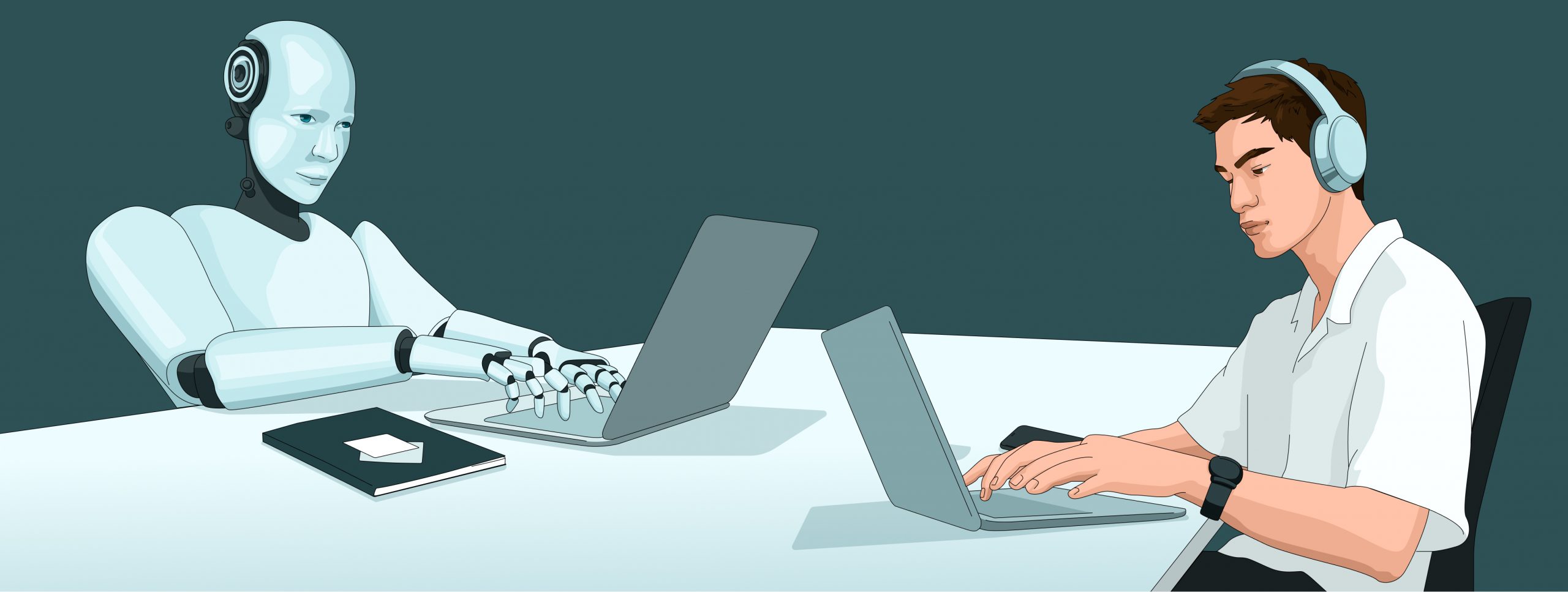With the advancements in artificial intelligence, there has been a growing interest in exploring the capabilities of AI models like ChatGPT application. While ChatGPT, a language model developed by OpenAI, has shown impressive abilities in generating text and answering questions, there are several reasons why it cannot fully replace programmers in software development. In this article, we will discuss four key reasons suggested by our ML specialists why developers remain essential in the field:
“1. The ChatGPT (v. 3.5) knowledge base is limited to September 2021, while the developer has access to more recent information and experience in a specific field. Versions of libraries, frameworks, or programming languages often get updated, and ChatGPT may generate code with deprecated functions.
2. ChatGPT operates based on a sequence of questions and answers; it cannot see the bigger picture or have a broad context. The developer can consider architectural decisions, performance optimization, unique project requirements, and other factors that cannot be fully replicated in the model.
3. Software development requires creativity and intuition. Developers can propose new ideas, find innovative problem-solving approaches, and apply their professional experience within the development context. ChatGPT lacks this intuition and is limited in generating new ideas.
4. Ethical considerations are crucial in software development, and decisions must align with legal requirements while prioritizing data security and confidentiality. However, ChatGPT cannot consider these factors.”
Ekaterina Kosareva, ML Engineer
Limited Knowledge Base
One of the limitations of ChatGPT application is its knowledge base, which is constrained by its training data. ChatGPT’s training only extends until September 2021, while developers have access to more up-to-date information and hands-on experience in specific domains. Libraries, frameworks, and programming languages undergo frequent updates, and ChatGPT may generate code with outdated functionalities or practices. The ever evolving nature of programming necessitates developers’ continuous learning and adaptation, which cannot be fully replicated by an AI model trained on fixed data.
Furthermore, programmers possess domain expertise that goes beyond mere knowledge. They understand the intricacies of various programming languages, frameworks, and tools, enabling them to make informed decisions based on current industry trends and best practices. This contextual understanding allows specialists to deliver robust and efficient solutions, tailored to the specific needs of the project.
Lack of Full Context
ChatGPT operates on a question-and-answer framework, which limits its ability to perceive the bigger picture or have a broad context. While it can provide answers and guidance based on individual questions, it cannot fully grasp the overall architectural decisions, performance optimization, and unique project requirements. Programmers, on the other hand, possess the capacity to evaluate trade-offs, make informed decisions, and design software solutions with a comprehensive understanding of the project’s scope.
Programmers take into account factors such as scalability, maintainability, and extensibility when designing software systems. They consider the interactions between different components, identify potential bottlenecks, and optimize performance. By having a holistic view of the project, programmers can create software that meets both functional and non-functional requirements, ensuring that the final product is efficient, robust, and reliable.
Inability to Make Creative and Intuitive Decisions
Software development often requires creativity and intuition. While ChatGPT coding for developers can provide general guidance, it lacks the intuition and creativity that humans bring to the table. Programmers contribute fresh ideas, find innovative problem-solving approaches, and apply their professional expertise to development contexts.
Software engineers are not just code generators; they are problem solvers. They can identify alternative solutions, consider different design patterns, and adapt their approaches based on the project’s unique needs. Their experience and creativity enable them to think outside the box, propose new ideas, and address complex challenges that may arise during development. This ability to think critically and creatively is crucial for developing innovative software solutions that push the boundaries of technology.
Inability to Consider Ethical Issues and Current Legislation
Developing software entails considering ethical considerations and adhering to legal frameworks, ensuring data security, and privacy. Programmers are responsible for making ethical decisions and ensuring that software complies with relevant laws and regulations. They possess the necessary knowledge and expertise to navigate the complexities of ethics and legal requirements, safeguard user interests, and create responsible software solutions.
ChatGPT, however, lacks the capability to incorporate these critical factors into its decision-making process. Ethical considerations, such as data privacy and algorithmic bias, require human judgment and moral reasoning. Developers are equipped with the ethical framework to assess potential risks, make informed choices, and prioritize user safety and privacy. By involving programmers in the development process, businesses can mitigate ethical and legal challenges, ensuring that the software solutions they create align with ethical guidelines and legal requirements.
“ChatGPT and other large language models (LLMs) can currently only solve common tasks. Furthermore, it is still the responsibility of the programmer to implement the code generated by neural networks. Yes, this technology can already significantly simplify developers’ lives, but it has limitations. For example, how would one use a neural network to write a large-scale service? And how would one modify it to support changes?
In theory, the level of abstraction will increase in the future, and developers will collectively start writing technical specifications (TS) for neural networks. However, at present, this seems more labor-intensive than contemporary programming practices. Today, creating precise TS for LLMs requires an immense amount of effort, comparable to or even exceeding the effort needed to write the desired code by specialists.
This becomes especially challenging when it comes to software updates. Making changes to code already generated by a neural network requires clear instructions, which can be difficult to formulate and may become grueling.
The responsibility for the performance of solutions generated by neural networks should also be considered. Ultimately, the developer remains accountable. What are the consequences for ChatGPT if it provides an incorrect answer? None. However, for the developer, it is a different story. As many examples demonstrate, ChatGPT cannot recognize errors and often confidently presents false solutions as correct.
A developer’s work involves an indescribable, unformalizable aspect, which may follow specific ideas or internal motivations. We are all familiar with the example of an “Italian strike” where workers start working like robots, strictly following regulations, and work grinds to a halt. It is unlikely that we will soon see systems capable of mimicking these complex constructs. It would require something more sophisticated than large language models.”
Evgenii Pustozerov, ML Engineer
The synergy between programmers and AI models holds great potential for advancing software development. By combining the strengths of both, we can harness the power of AI while benefiting from the creativity, context awareness, ethical considerations, and problem-solving abilities that human programmers bring to the table. The collaboration between ChatGPT and developers will continue to shape the future of software development, enabling us to create innovative, responsible, and efficient software solutions that meet the evolving needs of businesses.
At Exposit, we understand the importance of this collaboration and have a team of experts who possess profound domain and tech knowledge and experience in developing cutting-edge solutions. Also, we have experts in artificial intelligence, for example, Computer Vision, specializing in leveraging AI technologies to enhance software capabilities. Contact us today to discuss your business needs and explore the possibilities of integrating AI technologies into your projects.






